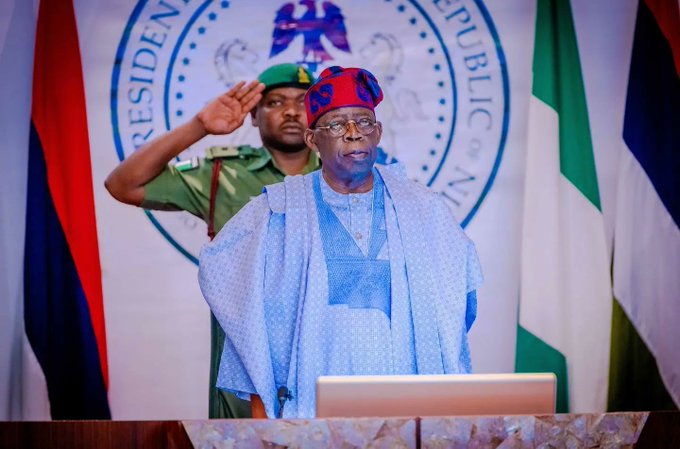Tinubu’s renewed hope on hungry stomachs?
As intended by the organisers of the currently raging wave of nationwide protests over hunger and other privations, today Saturday August 10 2024 marks its last day, having been scheduled to run for 10 days from August 1st. However, indications from both the boiling streets and government circles point to the fact that it is […]

Tinubu
As intended by the organisers of the currently raging wave of nationwide protests over hunger and other privations, today Saturday August 10 2024 marks its last day, having been scheduled to run for 10 days from August 1st. However, indications from both the boiling streets and government circles point to the fact that it is not yet Uhuru, as the country may be dealing with an unfinished business. That is even if the street protests may cease courtesy of the organisers fidelity to their plans, or government’s crackdown overwhelms the crowds. The fact remains that country can hardly be at ease any more for allowing the sordid drama of protests run in the first place, simply to prove the capacity of the administration to be tough with any opposition to its will. Meanwhile all the administration could have achieved is sheer, mindless obduracy.
Were wise counsel to prevail ab initio, the narrative for the country would have been more favourable as is easily understandable. By any consideration, it was crystal clear even before the protests, (just as the government seems to be coming to terms with reality so late in the day), that this dispensation of the hunger-driven protests, was one contest it had no chance of winning. For while the citizenry was crying for food, the government was reading the wrong script of political motivation of the protesters. The handlers of the administration failed to read the true picture that hunger was ravaging the entire country, courtesy of a cocktail of unmistakable factors, all traceable to the acts of commission and omission of the current Bola Tinubu administration.
Considering that Bola Tinubu campaigned for the office of the President with the mantra of renewing hope of a greater Nigeria, Nigerians took him for his word and voted him into the office of leadership and power. To accentuate the expectations by Nigerians from his administration, he had often stated his preparation for the office he is occupying today. Courtesy of the foregoing therefore, Nigerians trusted that he was sure footed with his governance initiatives. It is against the backdrop of the foregoing that not a few Nigerians feel betrayed by the circumstances of the protests, especially given the murderous angle the dispensation took with losses of innocent lives and extensive damage to both public and private property. Clearly, President Bola Tinubu should have done better, even if it was just preventing the mess.
With the protests now at the end of the notional terminal point, the situation calls for stock taking, and the first consideration is that Nigeria in its current circumstances has lost more than it could have gained by the patently avoidable social turbulence. This contention remains justified as contemporary processes of governance of the country have routinely been run without emphasis on a cost-benefit approach for policy formulation and implementation. It may, therefore, not be surprising if the ultimate cost of the crisis from the protests (as deleterious as such could be for the country), may still be justified by acolytes of the system, as a necessary sacrifice to shore up the egoistic inclinations of an emerging civilian junta, that is presently at the helm of affairs in the country.
Among the lessons from the protests is another ugly face of the deepening conundrum of crises in political leadership of the Nigeria state. Here was a situation where hunger and starvation were raging across the country and citizens were dying like flies on a parched field, while the living among them were protesting. However, all that the government offered was a fixation on the campaign promises of a renewed hope for the hungry citizens. Would the hope be sustainable on empty stomachs remains the yet unanswered question.
Beyond the fact that government had the benefit of preventing the protests given the circumstances of the country, especially with the advance notice given by the organisers, the president only offered a tepid response and a belated broadcast that not only ignored the main grouses of the protesting nation, but aimed at diverting attention from the prevailing crisis of suffocation of the citizenry. Rather, of more concern to the administration, a perceived threat of regime change. The immediate question here is, which takes precedence between the tenure of any president and the welfare of Nigerians?
In any case, an emerging scenario with the current Bola Tinubu administration is an unmistakable ambiguity over what to prioritise between citizen welfare and sustaining the status quo. This situation constitutes the elephant in the room as far as the administration’s proclivities portray. If nothing else points to that direction the handling of this wave of protests proves eloquently that Nigerians needs to be more discretionary with the ways of the administration which are tending towards the evolution of a monarchy with the president ending up as the uncrowned emperor, and the President of the Senate Godswill Akpabio, by his body language, ever willing to serve as the monarch’s chamberlain.
Meanwhile, it is significant to note that, while the protests may peter out, the onus still lies on the administration to address itself to the causative factors of the crisis. This is because anger caused by hunger cannot be decreed away by fiat, but only by the provision of real food. And Nigerians are not only hungry but are now also angry.
God save Nigeria.
